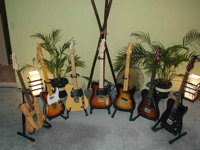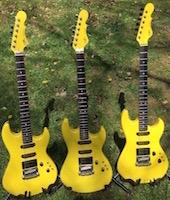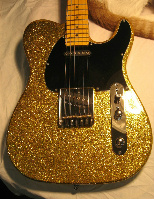I am looking to buy a digital multimeter to measure the DC-R in a few ASAT's, any recommendations on brand?
Pros and cons of different manufacturers is also appreciated. I'm not the most electrically minded guy, but want to get a better idea on some pup specs.
Digital multimeter choice
-
geoff douglas
- Posts: 216
- Joined: Wed Aug 06, 2014 9:50 pm
Re: Digital multimeter choice
Hi Sam These days all digital multimeters are good so basically it depends on how much you want to spend. If you want a quality product however and price is not an issue i couldn't recommend more highly the Fluke range of meters.
Cheers
Geoff
Cheers
Geoff
-
yowhatsshakin

- Posts: 3340
- Joined: Tue Feb 09, 2010 8:00 am
- Location: Seattle
Re: Digital multimeter choice
+1 on Fluke. They are absolutely great. However, as geoff indicates, they might be somewhat overkill for you want to do. I got mine from Radio Shack and it is plenty good enough for measuring DC-R values. And when you take measurements don't forget to turn all pots to 10.
- Jos
- Jos
-
sam

- Posts: 2058
- Joined: Sat Feb 20, 2010 9:38 am
-
Sprinter 92

- Posts: 386
- Joined: Sat Mar 20, 2010 9:25 am
- Location: Northwest Missouri
Re: Digital multimeter choice
Fluke, is the way to go. My Fluke 87 survived the entire 28 years that I was a mechanic.
-
FZTNT

- Posts: 973
- Joined: Tue Jan 19, 2016 3:27 pm
- Location: DC Area, Virginia
Re: Digital multimeter choice
I have had two Fluke meters for almost 30 years. I got outrageously good deals on them but normally they are quite costly. Never had to do anything but replace the batteries.
However, I would have to agree with Jos. Go to radio shack and pick up a $25 dollar meter if all you are doing is stuff on a guitar. One benefit of buying a Volt/Ohm meter is that you can test the power at gigs to make sure you're not plugging into 220 or reverse phase power, bad grounds and such. It's the first thing I do before unloading a single piece of gear and you would be surprised at the messed up circuits you will find.
Tom
However, I would have to agree with Jos. Go to radio shack and pick up a $25 dollar meter if all you are doing is stuff on a guitar. One benefit of buying a Volt/Ohm meter is that you can test the power at gigs to make sure you're not plugging into 220 or reverse phase power, bad grounds and such. It's the first thing I do before unloading a single piece of gear and you would be surprised at the messed up circuits you will find.
Tom
-
sam

- Posts: 2058
- Joined: Sat Feb 20, 2010 9:38 am
Re: Digital multimeter choice
Hey guys, thanks for feedback.
Went to a few hardware stores today and no Flukes. I do believe I will follow advice of Tom and Jos and go with a low cost version. My wife, non practicing engineer, says we have one somewhere. Will look for it or just go grab one.
Went to a few hardware stores today and no Flukes. I do believe I will follow advice of Tom and Jos and go with a low cost version. My wife, non practicing engineer, says we have one somewhere. Will look for it or just go grab one.
Cya,
Sam
Sam
-
darwinohm

- Posts: 3218
- Joined: Mon Mar 01, 2010 1:13 pm
- Location: Minneapolis/St Paul
Re: Digital multimeter choice
Another suggestion from one who has used a multi meter for 60 + years. I have both the digital and analog (needle pointer) and much prefer the analog display. For something as simple as checking the signal light circuit on an auto when flashing, the analog will show you the flashing circuit as it switches from 12 v to zero. A digital meter will not be stable enough to show that.
-- Darwin
-- Darwin
-
FZTNT

- Posts: 973
- Joined: Tue Jan 19, 2016 3:27 pm
- Location: DC Area, Virginia
Re: Digital multimeter choice
You won't find Fluke Meters in most hardware or Lowe's type places. Order on line or places like Grainger's carry them. But, like you said, the cheaper way is the better choice. Oh, also, get one that beeps to show a closed circuit. It helps if you are upside down under the dash of a car and can't see the meter but want to check continuity in a circuit.
Tom
Tom